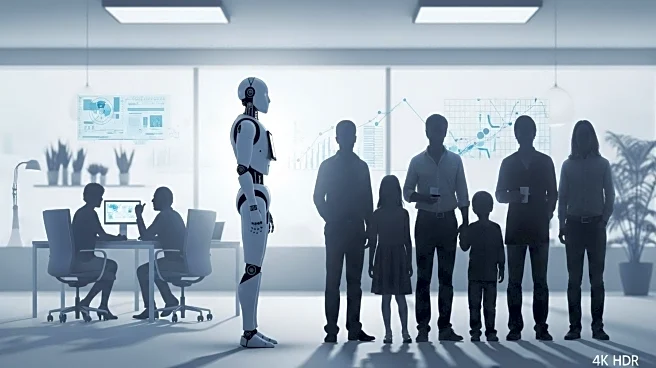What is the story about?
What's Happening?
Business leaders are increasingly integrating artificial intelligence (AI) into workplace functions, but this transition presents challenges for employees and HR teams. A report by Jobs for the Future indicates that only 31% of workers have access to AI training, despite 35% using AI tools at work. This gap highlights a significant learning curve in adapting AI capabilities to practical applications. Additionally, HR teams face a generational divide in AI usage and awareness. Pew Research Center data shows that 38% of adults under 30 have used OpenAI's ChatGPT for work, compared to 30% of those aged 30 to 49, and 18% of those aged 50 and above. This disparity underscores the need for HR departments to develop strategies to bridge these gaps and ensure equitable access to AI resources.
Why It's Important?
The integration of AI in workplaces has significant implications for workforce dynamics and HR practices. Younger workers are more likely to engage with AI tools, potentially leading to a shift in career trajectories towards skilled trades and similar occupations. However, the generational divide in AI usage could exacerbate existing inequalities, particularly if older workers are disadvantaged by AI-driven processes. This is exemplified by a lawsuit against HR vendor Workday, alleging discriminatory effects of its automated job platform features on older workers. Addressing these challenges is crucial for HR departments to foster inclusive environments and leverage AI's potential without marginalizing certain groups.
What's Next?
HR departments are tasked with articulating a clear vision to bridge the generational divide in AI usage. This involves developing comprehensive training programs and ensuring equitable access to AI tools across all age groups. Additionally, HR teams must address potential biases in AI-driven processes, particularly in recruitment, to prevent discrimination against older workers. As AI continues to evolve, HR departments will play a pivotal role in shaping workplace policies that balance technological advancement with inclusivity and fairness.
Beyond the Headlines
The ethical implications of AI in HR processes extend beyond immediate workplace dynamics. As AI becomes more integrated into decision-making, concerns about privacy, data security, and algorithmic bias will require ongoing attention. HR departments must navigate these complex issues to ensure that AI enhances, rather than undermines, workplace equity and employee well-being.
















